Goodbye Oil, Gas and Coal? The World Faces the Epic Challenge of the Paris Agreement
Air Date: Week of December 18, 2015
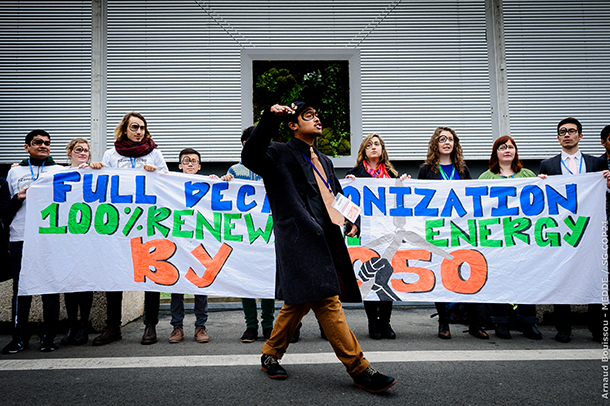
Youth protest inside of the climate conference center (Photo: Emmett FitzGerald)
With a new climate agreement in place, can its goals be achieved? Mark Hertsgaard, Environment Correspondent for the Nation Magazine tells host Steve Curwood that to keep the global temperature rise “well below 2 degrees Celsius”, we’re going to need to put an end to fossil fuel subsidies and stop drilling for oil and gas and totally decarbonize the global economy.
Transcript
CURWOOD: It’s Living on Earth, I'm Steve Curwood. For all that it was hard work to craft this agreement, any agreement that could be crafted was by definition a compromise. Many issues that some countries see as core were relegated to the preamble, not in the binding text, and scientists say though the 1.5 degree target is laudable, no concrete steps are required that would make it happen. To put this all in perspective we’re joined by Mark Hertsgaard, the Environment Correspondent for the Nation magazine – who was one of the thousands of journalists at COP21.
HERTSGAARD: The Paris agreement calls for limiting temperature rise to two degrees Celsius above preindustrial levels, 1.5 degrees is the “stretch goal” if you will. Either of those is essentially a death sentence for the fossil fuel industry as currently constituted. In order to hit the two-degree target, or certainly the 1.5-degree target, we've got to as a global civilization phase out fossil fuels more or less starting now. That means no more new oil refineries get built, no more new pipelines get built, no more coal mines get opened etcetera etcetera. And so that's a huge shift. Of course, we'll see if all that happens because the commitments that are included in the Paris agreement are voluntary. That's one of the big questions going forward is will world governments live up to the promises they made in Paris.
CURWOOD: One of the things that's not in the Paris Agreement, Mark, is a price for carbon. There was, of course, a system for pricing carbon in Kyoto, but that's gone. What happens next?
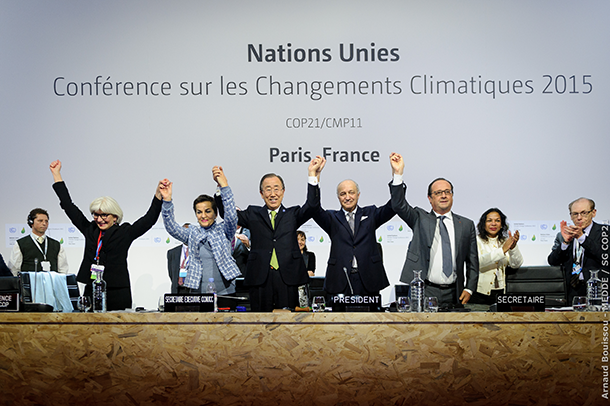
World leaders celebrate the Paris climate agreement (Photo: COP21, public domain)
HERTSGAARD: Putting a price on carbon is the single most powerful policy instrument that exists to fight climate change as long as there is no actual price, you know, you can't blame the marketplace that's going to go where it gets the signals. And so that's I think probably the single biggest question coming out of Paris, is that agreement - which is partly voluntary - is the Paris Agreement strong enough to send a market signal to investors and to businesses around the world. No, it didn't establish a specific price on carbon, but it certainly put the world community on record as moving towards a decarbonized world. The Paris Agreement does say that we will as soon as possible peak global emissions and that we will eliminate or go to carbon neutrality by the second half of the century. That implies a price on carbon, but it does not establish a price on carbon and I think that's going to be one of the big focuses in the months to come, is how do we get a price on carbon and where do we establish it and so forth.
CURWOOD: How fair is this agreement? Some countries, India among them, have said, look there's only so much space to continue emitting carbon and the rich countries rushing ahead, and we don't have a chance to use that pathway to development.
HERTSGAARD: This agreement is not as fair as it should be. It does not treat all emitting countries on the planet equally. People make a big deal about how China is supposedly the biggest global warming polluter, and it is on an annual basis, but that's not what the atmosphere cares about. The atmosphere cares about cumulative emissions over time and there the United States is still comfortably ahead, as is Britain because it was the birthplace of the Industrial Revolution and Europe in general. So that is a huge problem in terms of the fairness of this agreement and there's a second aspect to the fairness, Steve, which is that by saying that we are going to go for a two degree limit and we're only going to provide $100 billion a year in climate aid starting in 2020, aid that has not actually materialized, we are, this agreement essentially condemns literally tens of millions of people in countries like Bangladesh and the Marshall Islands and vast swaths of Africa, countries that are already experiencing horrific climate impacts. This agreement, by not being more ambitious, essentially condemns tens of millions of people to homelessness and poverty and death in the years ahead, and you can say that it was arguably the best agreement that could be achieved and I would argue that, given the political realities in particular here in United States where any agreement that was more specific or generous would've been forced to undergo the gauntlet of US Senate ratification as a treaty, and there the climate deniers and control of the Republican Party would've killed it. So arguably this is the terrible irony of Paris, that it is probably the best agreement that our political situation could achieve and yet it is both on scientific and humanitarian grounds, as Democratic presidential candidate Bernie Sanders says, "It doesn't go nearly far enough."
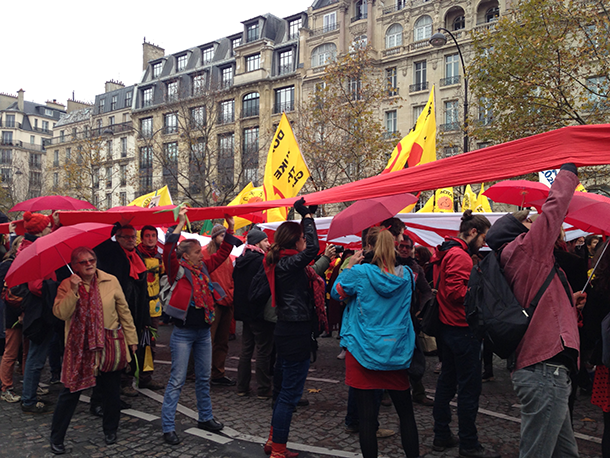
On the final day of the Paris climate conference, protesters stretched red banners through the city to symbolize the red lines in temperature rise that we cannot cross if we want to keep the planet habitable. (Photo: Emmett FitzGerald)
CURWOOD: What does this do for the future of fossil fuel subsidies? There's billions of dollars in fossil fuel subsidies around the world.
HERTSGAARD: Well, there's 40 billion just here in United States; around the world, it's hundreds of billions and it's not all by the way from countries like United States or Saudi Arabia or the petro-states. It's also a country like India where the government for its own political domestic reasons subsidizes the price of heating oil and kerosene so that the poorer classes can afford it. So it's not so obvious how to deal with subsidies in that kind of a domestic political situation. But clearly if you'd take the Paris Agreement seriously and the goal of getting to 1.5 degrees Celsius or least as well below 2 as you can get, you've got to get rid of all the fossil fuel subsidies, you have got to stop building fossil fuel infrastructure the locks you into 30 or 40 years of additional emissions going down the road, and that is the big political challenge here. And it gets to what has been probably the fundamental conflict in international climate diplomacy for the past 25 years, which is the conflict between climate change politics and climate change science. The science is very clear that we need to keep the temperature to at least as well below two degrees as we can. That means that we've got to peak emissions of global warming gases on this planet by 2020. Now that's possible, but we're not going to be able to do it unless we absolutely slam on the brakes of fossil subsidies and new fossil fuel infrastructure here in the United States and around the world.
CURWOOD: As we record this interview, Mark, there's talk on Capitol Hill permitting the export of oil from the US - it hasn't really been allowed for a number of years except in tiny amounts to Canada - in exchange for extending the subsidies for solar and wind. What you make of that?
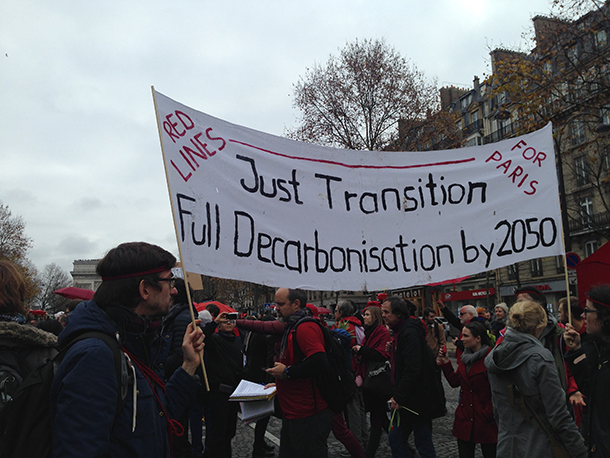
Common demands of protesters in Paris (Photo: Emmett FitzGerald)
HERTSGAARD: This is horse-trading on Capitol Hill as it's been practiced for centuries. You give me this and I'll give you that. And so the Republicans desperately want to lift the oil export ban that's been in place for 40 years and they're offering the Democrats that they will extend the production tax credit for solar and the investment tax credit for solar for another five years. That sounds like almost mature political deal-making in Washington. The problem is the planet, the atmosphere, does not care about what is politically viable in our human institutions. It only cares about physics and chemistry and mathematics and the amount of carbon dioxide and methane that are put up into the atmosphere, and so really again if we are going to be serious about hitting the Paris Agreement targets of keeping temperatures well below two degrees as close to 1.5 as we can, all additional new fossil fuel infrastructure has to stop and that includes exporting more oil around the planet. Also it includes fracking. And by the way, this is kind of a positive side - we do have one trump card up our sleeve here in terms of dealing with these temperature targets, which are so ambitious - which is methane. Methane is a very fast acting, but very potent greenhouse gas. And so if you cut methane emissions, you get an immediate almost payback reducing greenhouse gases in the atmosphere. So this again underlines how the Paris agreement really throws in the stark relief this long-standing conflict between what climate science demands and what climate politics and climate economics wants to offer.
CURWOOD: So the gap between those has been filled so far by a very active civil society. Some would say that the movement that happened in Paris can partially be attributed to the demonstration in New York last year, the divestment movements and so on and so forth, and there where thousands of people in the streets of Paris even at the time when the government there was was not going to permit it. Civil society can make this change. Can it? Will it?
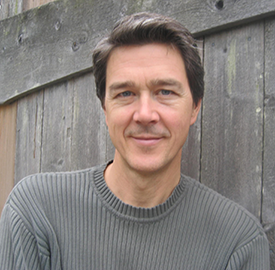
Mark Hertsgaard is Environment Correspondent for the Nation Magazine. (Photo: Francesca Vietor)
HERTSGAARD: Civil society has got to be pushing. That's the only way that these ambitious goals are going to be reached coming out of Paris, but I would include in civil society not just the climate movement which has been hugely important, but also businesses and investors and city and state officials around the world. Much more than national governments, they have been the leaders, those three groups: city officials and state officials, climate movement people, and the big question, business investors. Will they really step up? Will they really accelerate this transition away from fossil fuels at the speed necessary to preserve a livable planet? It's clear after Paris that the world is committed rhetorically to leaving fossil fuels behind, but the Exxon Mobiles and the Saudi Arabias in the world are not to take that lying down. They're going to fight to the end on this, and so I think we see up ahead a "battle royale" as they used to say, between the forces of the status quo, which is still wedded to the 20th century vision of a fossil fuel economy, and the 21st century vision of a green sustainable economy. There's no question that the Paris agreement would not have been talking about 1.5 degrees if you didn't have a very active and growing grassroots climate movement around the world plus a lot of pushing from the least developed countries. And so the big question coming out of Paris is can civil society, the activists, the businesses, the local political leaders and everybody listening to this broadcast, can they push the status quo much faster than it wants to go in order to save the planet for our kids and their kids?
CURWOOD: Mark Hertsgaard is author of "Hot" and an Environmental Correspondent for The Nation. Mark, thanks so much for taking this time with us today.
HERTSGAARD: My pleasure, Steve.
Links
The climate movement is now campaigning to end fossil fuel development on public lands
About Mark Hertsgaard and his work
Mark Hertsgaard’s book is called Hot: Living Through the Next 50 Years on Earth
Living on Earth wants to hear from you!
Living on Earth
62 Calef Highway, Suite 212
Lee, NH 03861
Telephone: 617-287-4121
E-mail: comments@loe.org
Newsletter [Click here]
Donate to Living on Earth!
Living on Earth is an independent media program and relies entirely on contributions from listeners and institutions supporting public service. Please donate now to preserve an independent environmental voice.
NewsletterLiving on Earth offers a weekly delivery of the show's rundown to your mailbox. Sign up for our newsletter today!
 Sailors For The Sea: Be the change you want to sea.
Sailors For The Sea: Be the change you want to sea.
 The Grantham Foundation for the Protection of the Environment: Committed to protecting and improving the health of the global environment.
The Grantham Foundation for the Protection of the Environment: Committed to protecting and improving the health of the global environment.
 Contribute to Living on Earth and receive, as our gift to you, an archival print of one of Mark Seth Lender's extraordinary wildlife photographs. Follow the link to see Mark's current collection of photographs.
Contribute to Living on Earth and receive, as our gift to you, an archival print of one of Mark Seth Lender's extraordinary wildlife photographs. Follow the link to see Mark's current collection of photographs.
 Buy a signed copy of Mark Seth Lender's book Smeagull the Seagull & support Living on Earth
Buy a signed copy of Mark Seth Lender's book Smeagull the Seagull & support Living on Earth

